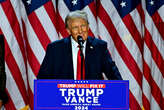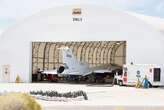President-elect Donald Trump campaigned with promises of sweeping tariffs on imports of foreign-made goods. Still, corporate executives have mostly shrugged off the potential impact of the former president’s threats as they wait to see what actually happens. And, given the postelection surge in the stock market this week, it appears tariffs are also a lesser concern for investors.
Mentions of “tariff” or “tariffs” during company calls that include quarterly earnings discussions and other events have numbered 429 since October 1, according to data collected by AlphaSense and shared with Fast Company. That’s about double the number of mentions during a comparable period in 2023. Despite the recent interest in tariffs, many CEOs have sought to reassure investors that their businesses will be relatively insulated and they’re prepared to navigate a changing tariff landscape.
During his campaign, Trump promised to impose 10% to 20% tariffs on everything that comes into the United States, along with an extra-steep tariff of up to 60% on goods imported from China. He also floated a tariff of 200%-plus on vehicles imported from Mexico and a similar levy on John Deere if the company were to move some of its production to Mexico from the U.S. During his prior administration, Trump imposed tariff increases, many of which the Biden administration kept in place.
Some companies act to offset tariff risks
While many companies are waiting to see whether Trump’s tariffs will come to fruition, others—including the shoe retailer Steve Madden and Traeger, which makes wood-fired grills—are taking the threats more seriously to minimize the impact on their businesses.
Steve Madden is already putting a plan into motion, as CEO Edward Rosenfeld said the company would halve its Chinese production to avoid Trump’s tariffs. “We have been planning for a potential scenario in which we would have to move goods out of China more quickly,” Rosenfeld told Wall Street analysts Thursday. “You should expect to see the percentage of goods that we sourced from China to begin to come down more rapidly going forward.”
Traeger, meanwhile, has “the ability to react reasonably quickly and reasonably efficiently” as the tariff landscape evolves and will make decisions accordingly, CEO Jeremy Andrus said on a call with analysts on Wednesday. He added that about 80% of Traeger’s grills are manufactured in China and tariffs aren’t currently assessed on these products, though they are imposed on accessories. “We’re looking closely at other manufacturing options in Asia.”
Many global brands remain unfazed
Likewise, Airbus’s CEO expressed concern about how tariffs might affect prices for airline customers, as Business Insider reported. That proved to be an exception to executives from the likes of BMW, Puma, Ikea, and DBS, Singapore’s largest bank, who expressed a mostly relaxed attitude about Trump’s tariffs threats in the wake of his victory on Tuesday.
Some of the subdued reactions from corporations may simply be because they are accustomed to changing tariff regimes. That was the sentiment expressed by Scott Roe, chief financial officer of Tapestry, on an earnings call earlier this week. Tapestry, the parent company of Coach, Kate Spade, and Stuart Weitzman, benefits from a “diverse and agile supply chain,” as he noted.
Benoît Coquart, CEO of Legrand, the French manufacturer of electrical and lighting equipment, is among the executives waiting to see how the tariffs will be implemented and on what products. “If the tariff were to be implemented as per the initial thoughts of the new administration, the inflation in the U.S. would be so big that it would be difficult for U.S. citizens to bear the impact of those tariffs,” he said. “There are a lot of question marks.”
Tariffs could raise prices, slow growth
As part of their 2024 GOP platform, Republicans noted that increasing tariffs on foreign producers would mean that taxes for Americans could come down. But many economists, including several on Wall Street, have countered that higher tariffs could be inflationary and hamper economic growth.
The typical U.S. household could see their income fall by nearly $3,000 in 2025 due to higher prices, according to an estimate by the Tax Policy Center and Peterson Institute. If imposed, Trump’s proposed tariff increases could shrink gross domestic product (GDP) by at least 0.8% and employment by more than 680,000 full-time equivalent jobs, according to an analysis by the Tax Foundation.
Tariffs will likely remain a theme as the third-quarter corporate earnings season continues. Walmart and Target, both big importers from China, are scheduled to report results later this month.









No comments